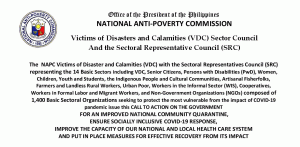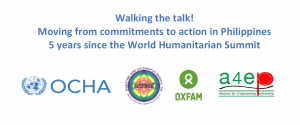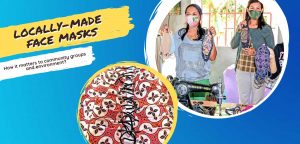
Brot für die Welt’s program manager for the Philippines Jonna Lena Raphaela Seemann visited the abaca farmers in the hinterland of sitio Salvador of barangay Rogongon, some 40.4 kilometers far from the urban sites of Iligan city on February 22, 2023 accompanied by ECOWEB’s officers and staff.
Among the highlights of Seeman’s field visit was her focus group discussion with abaca farmers; a field visit in an abaca farm where she had a direct conversation with women farmers; a quick experiential touch on producing a fiber using a traditional extractive tool; an observation on mechanical diesel-powered decorticating device; a visit in abaca training center with baling facility; a brief sensitization on the life of abaca farmers’ lives; and a meeting with Formation of Production Guilds and Social Enterprises for the Economic Development of Indigenous Communities (FPGSEEDIC) staff and ECOWEB’s executive director Regina S. Antequisa.
Working with fiber producers
ECOWEB is in a three-year engagement of implementing the FPGSEEDIC with 937 farming families within the three ancestral domains in two regions, three municipalities/cities, and 15 barangays within Iligan, Misamis Oriental, and Bayog, Zamboanga del Sur.
FPGSEEDIC is supported by Brot für die Welt which focused on Formation of Abaca Production Guilds and Consolidation of Production Areas; Gender -responsive Training for Sustainable Abaca Farming; Abaca Nursery Development; and Enhancing Sustainability of Abaca Farms.
Of 2,430 persons or partners from organized guilds, 40% of these are women who have participated in different farm development activities albeit the challenges to increase the indigenous women’s participation and visibility in the sustainability of the abaca plantation industry due to cultural limitations.
The project supported 1,032 hectares of land planted with 793,544 abaca hills– an endeavor that advocates a climate-smart agriculture.

Capacity-development
Seemann’s saw too how abaca farmers, belonging to the Salvador Migsabua Farmers Association, wrestled with both mechanized and traditional chain of harvesting abaca fiber from the hinterland until the product is delivered to a local buying station, and eventually hauled for baling and further classification in Ecossol, a social enterprise of ECOWEB that currently provide support for consolidating the abaca produce of the production guilds, to ensure standard quality and required volume are complied before delivery to NewTech Pulp Inc. located in Baloi, Lanao del Norte, less than 50 kilometers from the farmers village in Rogongon.
FPGSEEDIC project implementation highlighted farm development among 36 organized production guilds (PGs) — inclusive of 186 active self-help groups (average of five households per SHG). There are also currently about 1,096 hinterland farmers registered to Registry System for Basic Sectors in Agriculture (RSBSA) with the assistance of students-interns from Mindanao State University-main campus.
To help the minimal number of project staff and mobilization amid COVID-19, ECOWEB mobilized two community volunteers and 20 Sustainable Community Development students on practicum from the Mindanao State University, Marawi City and another 10 Social Work students from another collage in Marawi who were deployed in the organized production guilds to support them in their organizational development needs in collaboration with barangay officials.
Further, FPGSEEDIC mobilized two community volunteers at the height of Covid-19 pandemic with 20 students on practicum from MSU-Main campus’ Social Work and Community Development who were deployed in the organized production guilds to support them in their organizational needs and upscaling in collaboration with barangay officials.
There were 85 self-help groups organized with 5 member families each comprising the 17 production guilds who were provided with Farm ‘Hunglos’ Support (cash and rice) to help 1,174 PG members who participated in farm development of which 263 or 22% female are females and 900 or 78% are males’ farmers. Each production Guild has a minimum of 25 members farming families.
There are now 37 production guilds (PGs) fully registered under the Department of Labor and Employment (DOLE) while two PGs are yet to undergo the process of registration. Of these 37 PGs, there are 29 of them that have completed the Workshop on Abaca Farming Standards and Appropriate Methods.

Moreover, 28 PGs have participated in Gender-Responsive Training for Sustainable Abaca Farming from June 2021 to February 2022 with a total of 455 participants of which 261 (57%) are men and 194 (43%) are women. There are also 25 PGs that have attended the Gender-based Food Always in the Home Gardening Training for Food Security and Risk Mitigation with an introduction on Mushroom Production. About three batches of inter-farm visits had been conducted, too.
In the last two years, 29 PGs have established their respective abaca plant nursery while about 40 self-help groups also made their own separate nurseries with trainings conducted. ECOWEB also partnered with the Iligan City Agriculture Office in establishing central abaca nursery to enhance the production to meet the increasing demand for abaca seedlings by the PG members.
Farm tools provisions
To improve the capacity of farmers, the 38 PGs were provided farm tools and abaca nursery materials. Five PGs in Rogongon were also oriented on Disaster Risks Reduction and Climate Change Adaptation for Farm Development and Household Resiliency in cooperation with the MSU-IIT-Mindanao Center for Resiliency. Abaca farmers in Kalilangan and Panoroganan have also availed 4-week long training on Abaca Sustainable Farm Management Training (ASFMT).
The tooling and capacity-building intended to have at least 800 farmers and farmer entrepreneurs, of which 640 or 40% are women, directly benefit from the project in the three ancestral domains in north-western Mindanao. It also aims to increase their farm productivity by an average of 25%.
There were 345 tuxy knives, 162 manual hand stripping (langgitan), and 42 spring type manual hand stripping tools which has surpassed the original target of distributing five (5) manual stripping/PG x 32 PGs or 160 units. Those production guilds which has high production capacity were the recipients of the five Decorticating Machines, three Spindle Machines, two dual spindle-deco.
As of the first quarter in 2023, there are 937 farming families that have directly benefited from the projects within the three ancestral domains and they have likewise increased their farm productivity by 25% on average. Of the 2,430 total participants in abaca fiber production, 971 or 40% are women are involved in abaca farming.

IP’s social enterprises
On Indigenous Peoples Social Enterprise Development, 15 PG-based social enterprise on abaca trading sustained their operation. About five seven (7) PGs have sustained selling their fiber thru Ecossol which secured purchase order from Newtech Pulp that sets prices based on fair market value (based on set buying price by NPI). From February 2022 to February 15, 2023, a total of 74,922.5 kg. of fiber have been delivered by PGs to Ecossol with a total worth of ₱5,005,524.00 paid to PGs. This is the “minimum income” earned by the abaca farmers and circulated in the community in a year. Ecossol has secured purchase order from the Newtech Pulp being an accredited abaca fiber supplier after complying its standard requirement.
There were also three batches of Abaca Fiber Classification Training (AFCT) conducted involving women as fiber classifier. This improved their knowledge on producing quality grade of abaca fiber from Grade JK (low quality of abaca fiber) to I and G grade fiber (good quality) with some S2 (excellent fiber grade), hence increasing the income of the PG members which they maximized for the improvement of their dwellings, education of their children, acquisition of personal properties, motorcycle, furniture, and equipment.

On Indigenous Peoples Social Enterprise Development, 15 PG-based social enterprise on abaca trading sustained their operation and continue to sell their fiber thru EcoSSol. The price of abaca fiber provided by PGs and EcoSSol is based on fair market price (based on set buying price by NPI). As of February 15, 2023, a total of 74,922.5 kg. of fiber have been delivered by PGs to EcoSSol with a total worth of ₱5,005,524.00 paid to PGs. This is the “minimum income” circulated in the community in a year. EcoSSol has also secured long-term order from Newtech Pulp.
At least one central Fiber Processing and Learning Facility (FPLF) was established with baling equipment and three community-based learning sites were developed. Three clustered training were conducted for abaca harvesters and fiber strippers.
There were also three batches of training on Abaca Fiber Classification Training (AFCT) were conducted involving women as fiber classifier. This improved their knowledge on producing quality grade of abaca fiber from Grade JK (low quality of abaca fiber) to I and G grade fiber (good quality), hence increasing the income of the PG members which they maximized for the improvement of their residences, education of their children, acquisition of personal properties, motorcycle, furniture, and equipment.
Focused group discussion was further conducted with IP representatives in Limunsudan gaop with NCIP and City Agriculture. From the results and presentations, they drafted the IPSE Concept and Validation of IPSE Operational Guidelines.
To assure farmers of the Fair Market Price Assurance of Abaca Fiber, Ecossol initiated the improvement of grading and baling facility as a licensed Class A Trader of abaca. The facility also serves as a training center for abaca fibers classification.
As the project continues its implementation, it hoped to provide seed capital for social enterprise capitalization as all of the qualified production guilds when they become capable of managing of a community-based abaca fiber buying station. Most the 14 PG members are still on abaca farm production phase.

Advanced Abaca fiber producers
The City Agriculture Office, in partnership with ECOWEB, supported advanced production guilds to access significant financing or support service agreement amounting to P 500,000 for its sustainable IPSEs development in the ancestral domain and realize their abaca plantation’s expansion plans.
As to Enterprise Management and Capacity Development, 32 PGs have attended Social Enterprise Management Workshop and Social Enterprise General Orientation (SEGO) and HH Budgeting. Financial Management Training was also conducted for production guilds in Bayug-Iligan ancestral domain and in Bayog-Zamboanga del Sur ‘s PGs. Technical assistance and coaching were also provided to those who sought for assistance.
ECOWEB was also supportive of farmers groups able to network and access supports directly from Department of Trade and Industry and from the academe supporting organizational and ancestral domain development and investment planning towards a resilient IPSE in this post-pandemic period.



